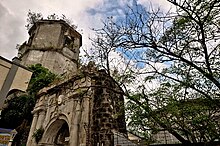San Diego de Alcala Church
| Polo Church | |
|---|---|
| Saint Didacus of Alcala Parish Church | |

The surviving bell tower and entrance of the first San Diego de Alcala Church
|
|
| 14°42′27″N 120°56′44″E / 14.707444°N 120.945458°ECoordinates: 14°42′27″N 120°56′44″E / 14.707444°N 120.945458°E | |
| Location | Valenzuela, Philippines |
| Country |
|
| Denomination | Roman Catholic |
| History | |
| Dedication | Saint Didacus |
| Architecture | |
| Status | Parish church |
| Functional status | Active |
| Architectural type | Church building |
| Style | Baroque |
| Specifications | |
| Materials | adobe bricks |
| Administration | |
| Archdiocese | Manila |
| Diocese | Malolos |
| Clergy | |
| Archbishop | Luis Antonio Tagle |
| Bishop(s) | Jose Oliveros |
San Diego de Alcala Church is a parish church in Valenzuela, located about 15.5 kilometres (9.6 mi) north of Manila in the Philippines. The original church was the oldest church in the city, built by Father Juan Taranco and finished by Father Jose Valencia in 1632. Destroyed during World War II, its surviving belfry is the oldest in the city.
The Church of San Diego de Alcala in Brgy. Polo in Valenzuela was completed in 1632. Residents were forced into labor to complete the church after the town gained its independence in 1623 from Catangalan through the efforts of Father Juan Taranco and Don Juan Monsod, the barangay head of Polo. The main structure was destroyed by bombs during the Japanese occupation of the Philippines in World War II. The belfry and entrance are the only parts of the four-century old edifice that remain today. They have been preserved by the citizens of Polo.
The belfry or bell tower of San Diego de Alcala Church is a cultural and religious relic of the bygone Spanish era. A new church has since been rebuilt and renovated adjacent to the ruins, serving as an aesthetic counterpoint to the largely unchanged tower.
Residents of barangays Polo and Poblacion celebrate the feast day of San Diego de Alcala on the 12th of November every year. Together with the fiesta, the town also celebrates the "Putong Polo Festival", a food festival honoring the putong Polo, a local variety of the Philippine rice cake puto.
...
Wikipedia

